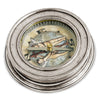Polaris Desk Compass - 6.5 cm Diameter - Handcrafted in Italy - Pewter & Glass
The compass, one of the most fascinating of instruments, and Cosi Tabellini have crafted a desk version, cradled within a solid pewter base and frame, with a classically-inspired face, denoting the four cardinal points - North, East, South and West - allowing one to navigate. As well as a classic measuring instrument, it makes an excellent paperweight.
The theory that the Chinese invented the compass derives from the legend of the "south-pointing chariot", a machine in which the arm of a humanoid figure always pointed towards South. If we are to believe this, then the compass appeared as early as 2634 BC, the year in which the Emperor Huang-ti fought and won a battle against rebels making use of these chariots to guide his troops against the enemy through a thick fog. However, for the skeptics, or realists among us, the first real evidence that the Chinese used the compass during the Han Dynasty between the second Century BC and first Century AD.
These first compasses were made of lodestone, which is a type of naturally magnetic iron ore called magnetite, which when suspended turns freely, always resting in the same direction, aligning itself toward the magnetic poles. These first compasses were used for to source precious stones, fortune telling, and deciding on the position of a house, all ancient forms of harmonising with the environment - in fact an early form of Feng Shui. The first instance in which a compass seems to have been used to navigate is contained in a book entitled P'ing-chou-k'o-t'an which dates back to about the end of the eleventh Century, during the innovative Song Dynasty.
It has also been thought that the compass was invented by the Islamic world around the thirteenth Century, a theory supported by the fact that at that time they enjoyed unchallenged superiority in the scientific field and were highly skilled in the art of navigation, and it can be seen that around this time they were linking compasses to astronomy. Yet other scholars observe that the Arabs, Turks and Persians all called the navigational instrument "bossola", a word derived from Italian. This would support a European origin, and Scandinavian references date back to about 1250 AD, and elsewhere in Europe the late 12th Century. It seems with the onset of travel and exploration, the concept of navigation, and the use of a compass evolved and dispersed over the globe.
Whatever the origins, a compass always is fascinating to young and old, and makes a poignant gift, ideal for displaying, perhaps on a desk or bookshelf, or maybe used as a paperweight; it is also a thoughtful and philosophical gift for a young person, symbolically given to aid their navigation through life itself.
Buying as a gift? Why not make it even more special with our engraving service?
Size: Diameter 6.5 cm
Weight: 110 g
Materials Used: Pewter
Ref: CT0096601
Designers: Enrico Cosi & Sergio Tabellini
100% Lead Free
All Cosi Tabellini Pewter is 100% lead-free, so it is totally food & drink safe, and is both EU and US FDA approved.
Packaging
Cosi Tabellini pieces come gift-boxed with a guarantee card and instructions on how to care for pewter.



